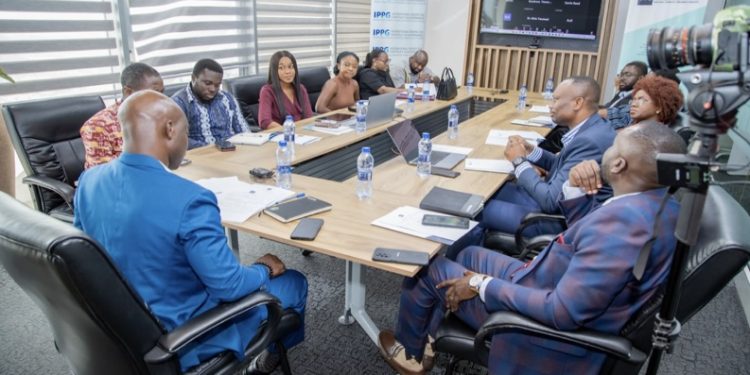
For many Ghanaians, the country’s energy crisis is synonymous with the Electricity Company of Ghana (ECG). From frequent power outages and billing discrepancies to frustrating customer service and metering issues, ECG is the visible face of the sector’s challenges.
But a new report by the International Perspective for Policy and Governance (IPPG) warns that focusing solely on ECG masks the much deeper, structural issues at play across the entire energy value chain.
The report, “Securing Ghana’s Energy Future: Policy Actions for Sustainability and Efficiency,” presents a whole-system diagnosis of the country’s energy sector and outlines urgent actions needed to be prioritised by the NDC government for reform.
The report draws from an energy expert boardroom convening by IPPG held in Accra in February 2025, which brought together stakeholders from civil society, academia, consulting, law, and audit firms, as well as independent power producers (IPPs), among others.
Their conclusion is clear: ECG’s challenges are only the most visible layer of a complex, multi-point crisis that is draining public finances, undermining investments, and threatening Ghana’s long-term development.
While advocating for private sector participation in ECG’s commercial operations, the report emphasises that ECG’s persistent technical and distribution losses, unregulated procurement expenditures, revenue underperformance, and the mismatch between cedi-based collections and dollar-indexed obligations cannot be resolved through technical interventions alone. Addressing these challenges requires sustained political commitment and institutional reforms to enable financial viability and effective service delivery.
Beyond ECG
Beyond ECG, the report reveals a stagnant upstream oil and gas sector that has seen no significant new investment in about eight years. This has weakened Ghana’s oil and gas production capacity, fiscal outlook, and potential for domestic job creation. In the midstream sector, the report also highlights persistent reliability challenges in domestic gas supply, particularly with Ghana National Gas Company (GNGC), which continues to deliver inconsistent and insufficiently processed gas for baseload power and industrial use.
These challenges are compounded by Ghana’s reliance on gas imports through the West African Gas Pipeline (WAGP), exposing the country to supply disruptions stemming from payment arrears, technical faults, and upstream constraints.
A critical thread running through the report is the government’s persistent failure to apply sound business principles in energy planning and operations, an oversight that has compounded financial distress across the value chain.
From tariff frameworks that do not reflect the true cost of electricity generation to the absence of a dedicated budget allocation for electricity subsidies, the sector continues to suffer from governance choices that undermine financial discipline. These are not simply technical lapses, the report notes, but reflect a deeper lack of political resolve to enforce accountability and align operational decisions with fiscal sustainability.
At the same time, Ghana’s renewable energy ambitions remain largely aspirational, with limited progress in diversifying the energy mix and persistent reliance on costly fossil fuel imports. The report notes that despite policy commitments, implementation has lagged, particularly in scaling up solar and wind power. The current net metering code, the report notes, is ineffective, hindered by restrictive limits and a lack of economic incentives, ultimately slowing the adoption of distributed renewable energy solutions.
Another pressing issue highlighted in the report is the stalled implementation of renegotiated power purchase agreements (PPAs) with Independent Power Producers (IPPs). Initiated under the previous NPP administration, the renegotiation process was intended to realign contract terms with Ghana’s fiscal realities and reduce the unsustainable financial burden on the sector. However, the current government has yet to fully implement these revised agreements as of February 2025 when IPPG convened the energy expert boardroom meeting.
The report also raises concern about the practice of state institutions entering into energy-related agreements that are fiscally detrimental to the state and the energy sector. It cites instances where government agencies have signed contracts without rigorous due diligence or long-term financial planning, resulting in obligations that strain the national budget.
What emerges from IPPG’s assessment is not a sector lacking in knowledge or planning, but one in which implementation has consistently been obstructed by fragmented governance, financial opacity, and political incentives that reward inaction. The report calls for a reset, not just in operational terms, but in political commitment and institutional discipline.
Recommendations
To address the sector’s challenges meaningfully, the report urges immediate action from the government and Ministry of Energy in a time-bound reform pathway. In the short term, it calls for decisive political action to strengthen ECG’s revenue collection and operational discipline, restore confidence and revive upstream oil and gas investments, and ensure the implementation of a transparent cash waterfall mechanism to guarantee timely payments to Independent Power Producers (IPPs), among others.
In the medium term, the government’s policy priorities must include a comprehensive policy audit to streamline existing energy policies and clarify regulatory mandates. Efforts should also focus on strengthening monitoring, evaluation, and institutional learning systems to prevent recurring policy cycles and avoid duplication of sector reforms. Additionally, revising and implementing the net metering code will be essential to unlocking the full potential of distributed renewable energy and accelerating Ghana’s energy transition.
Over the long term, the report advocates for a fundamental redefinition of the state’s role in electricity delivery, transitioning ECG into a performance-based utility through targeted private sector participation, and building a more accountable, efficient, and investor-ready energy sector.
DISCLAIMER: The Views, Comments, Opinions, Contributions and Statements made by Readers and Contributors on this platform do not necessarily represent the views or policy of Multimedia Group Limited.
Tags:
DISCLAIMER: The Views, Comments, Opinions, Contributions and Statements made by Readers and Contributors on this platform do not necessarily represent the views or policy of Multimedia Group Limited.
- President Commissions 36.5 Million Dollars Hospital In The Tain District
- You Will Not Go Free For Killing An Hard Working MP – Akufo-Addo To MP’s Killer
- I Will Lead You To Victory – Ato Forson Assures NDC Supporters
Visit Our Social Media for More




